Related Research Articles
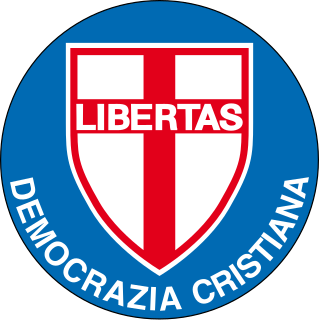
Christian Democracy was a Christian democratic political party in Italy. The DC was founded on 15 December 1943 in the Italian Social Republic as the ideal successor of the Italian People's Party, which had the same symbol, a crusader shield. As a Catholic-inspired, centrist, catch-all party comprising both centre-right and centre-left political factions, the DC played a dominant role in the politics of Italy for fifty years, and had been part of the government from soon after its inception until its final demise on 16 January 1994 amid the Tangentopoli scandals. Christian Democrats led the Italian government continuously from 1946 until 1981. The party was nicknamed the "White Whale" due to its huge organization and official color. During its time in government, the Italian Communist Party was the largest opposition party.
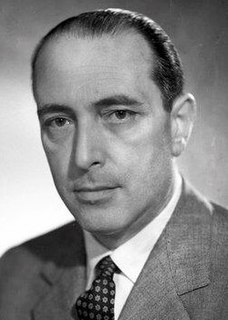
Fernando Tambroni Armaroli was an Italian politician, member of the Christian Democracy, who served as 36th Prime Minister of Italy from March to July 1960. He also served as Minister of the Interior from July 1955 until February 1959, Minister of Budget and Treasury from February 1959 to March 1960 and Minister of the Merchant Navy from August 1953 until July 1955.
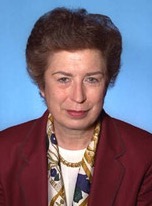
Rosa Russo Iervolino is an Italian politician.

Giuseppe Di Vittorio, also known under the pseudonym Nicoletti, was an Italian syndicalist and communist politician. He was one of the most influential trade union leaders of the labour movement after World War I.

The Italian General Confederation of Labour is a national trade union based in Italy. It was formed by agreement between socialists, communists, and Christian democrats in the "Pact of Rome" of June 1944. In 1950, socialists and Christian democrats split forming UIL and CISL, and since then the CGIL has been influenced by the Italian Communist Party (PCI) and until recent years by its political heirs: the Democratic Party of the Left (PDS), the Democrats of the Left (DS) and currently the Democratic Party (PD).

The Italian Labour Union or UIL is a national trade union center in Italy. It was founded in 1950 as a socialist, social democratic, (republican) and laic split from the Italian General Confederation of Labour. It represents almost 2.2 million workers.

Mariotto Segni is an Italian politician and professor of civil law. He founded several parties, which focused on fighting for electoral reform through referendums. He is the son of the politician Antonio Segni, one time President of the Republic of Italy.

The 1994 Italian general election was held on 27 and 28 March 1994 to elect members of the Chamber of Deputies and the Senate of the Republic for the 12th legislature. Silvio Berlusconi's centre-right coalition won a large majority in the Chamber of Deputies but just missed winning a majority in the Senate. The Italian People's Party, the renamed Christian Democracy (DC), which had dominated Italian politics for almost half a century, was decimated. It took only 29 seats versus 206 for the DC two years earlier—easily the worst defeat a sitting government in Italy has ever suffered, and one of the worst ever suffered by a Western European governing party.
Teodem is a Christian-democratic faction with the Italian Democratic Party, which combines social-conservative views on ethical issues with a Christian leftist approach on economic issues.
The Populars is a loose association within the Democratic Party (PD), a political party in Italy.

The Legislature XII of Italy lasted from 15 April 1994 until 8 May 1996. Its composition was the one resulting from the snap general election of 27 March 1994. The election was called by President Scalfaro, after he dissolved the houses of Parliament on 16 January 1994. This decision was connected to some major events that permanently changed the shape of Italian internal politics during the beginning of the '90s, such as Tangentopoli and the Mafia trials.
The United Trade Unions of the Free Territory of Trieste, initially called the United Trade Unions of the Julian March, was a trade union confederation in the Free Territory of Trieste. The confederation was politically connected to the Communist Party of the Free Territory of Trieste (PCTLT/KPSTO).
Achille Grandi was an Italian politician and catholic syndicalist.

Andrea Olivero is the Italian Vice Minister for Agricultural, Food and Forestry Policies and a senator of the Italian Republic. He has been President of the Christian Associations of Italian Workers from 2006 to 2012.

Giovanni Bianchi was an Italian politician.
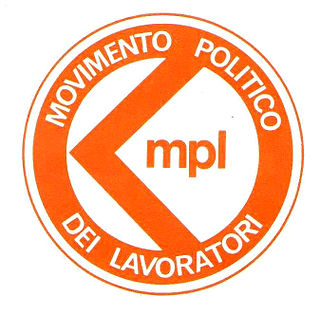
The Workers' Political Movement, also translated as Political Movement of Workers, was a small political party in Italy led by Livio Labor.
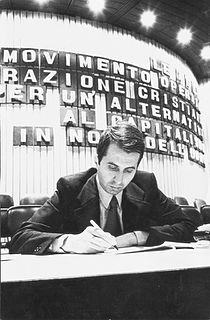
Emilio Gabaglio is an Italian former trade union leader.

Luigi Covatta was an Italian politician and journalist. A member of the Italian Socialist Party, he served in the Chamber of Deputies from 1979 to 1983 and the Senate of the Republic from 1983 to 1994.

Carlo Pareschi was an Italian Fascist politician, member of the Grand Council of Fascism and minister of agriculture of the Kingdom of Italy from 1941 to 1943.

Carlo Tiengo was an Italian Fascist politician and civil servant, Minister of Corporations of the Kingdom of Italy from February to April 1943 and member of the Chamber of Fasces and Corporations. He also served as prefect in several Italian cities, including Trieste, Milan and Turin.
References
- 1 2 Andall, Jacqueline (2000), "Organizing Domestic Workers in Italy: The Challenge of Gender, Class and Ethnicity", Gender and Migration in Southern Europe: Women on the Move, Berg, p. 148
- ↑ "Come nascono le Acli". Acli.it. Retrieved 2014-01-05.
- ↑ La Camera dei Deputati. "La Camera dei Deputati". Legislature.camera.it. Retrieved 2014-01-05.
- 1 2 3 "Acli Lombardia". Aclilombardia.it. 2013-10-30. Retrieved 2014-01-05.
- ↑ "Livio Labor in Dizionario Biografico – Treccani". Treccani.it. Retrieved 2014-01-05.
- ↑ "Livio Labor". Acli.it. Retrieved 2014-01-05.
- ↑ "Le notizie". Acli.it. Archived from the original on 2011-10-31. Retrieved 2014-01-05.
- ↑ "Le notizie". Acli.it. Archived from the original on 2013-07-02. Retrieved 2014-01-05.
- ↑ "Emilio Gabaglio - Profilo personale | Partito Democratico". Partitodemocratico.it. Archived from the original on 2014-01-06. Retrieved 2014-01-05.
- ↑ "Il flop di Passuello, uomo nuovo della Quercia". Archiviostorico.corriere.it. Retrieved 2014-01-05.